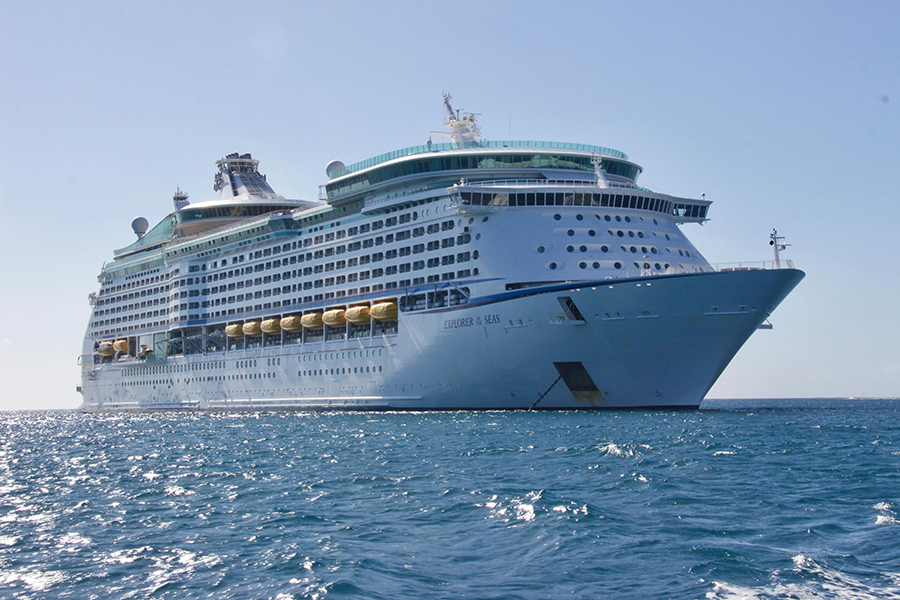In this blog, we’ll give you some ideas for ensuring your next cruise is hearing-loss-friendly.

Cruise vacations offer wonderful opportunities for relaxation, adventure, and creating lasting memories with family and friends. For travelers with hearing loss, planning ahead and clear communication with cruise staff can help make your experience stress-free and enjoyable. Let’s take a look at a few tips to make your cruise hearing loss-friendly.
Request Visual Alert Systems for Your Cabin
Contact your cruise line well before departure to request cabins equipped with visual alert systems for door knocks, telephone calls, and emergency alarms. These systems ensure you receive important notifications and safety alerts even when you’re not wearing assistive listening devices or during the night when you might miss audio-only alerts. Most major cruise lines maintain accessible cabins with these features, though availability can be limited. Try to book your cruise as early as possible to secure a cabin with visual alert features, especially during peak travel seasons.
Communicate Your Needs to Crew Members
Inform your cabin steward and guest services about your hearing loss and communication preferences upon boarding. Clear communication helps crew members understand how to interact with you effectively, whether you prefer written notes, face-to-face conversations, or other preferences. You can also use communication preference cards for quick and easy explanations of your preferences.
Establish communication plans with guest services for emergency situations, ensuring crew members know how to contact you effectively if urgent situations arise. Ask about ship-wide alert systems and confirm you understand how you’ll receive emergency notifications throughout the vessel. Guest services may also offer you additional hearing devices or sit you in reserved seating for shows or events that make your trip more comfortable.
Pack All Necessary Hearing Devices and Supplies
If you wear hearing aids, bring plenty of hearing aid batteries or ensure you pack chargers for rechargeable devices. If you’re planning on an international cruise with land stops, ensure you have an adaptor to fit local outlets for recharging your devices.
Pack backup hearing devices if you have them, along with cleaning supplies, drying kits, and a travel-safe, waterproof case that can protect them against moisture from ocean spray, pool areas, or humid cabin environments.
Requests for Entertainment
Contact guest services before attending shows, presentations, or entertainment events to request assistive listening devices or personal amplifiers that your cruise line may provide for theater performances and lectures. These systems transmit audio directly to your hearing aids or headphones, amplifying sound clearly above background noise common in large entertainment venues. You can also ask about captioning availability for movies, shows, and informational presentations shown throughout your cruise. Many cruise lines offer closed captioning for in-cabin television and some onboard entertainment, though you may need to request activation from the crew.
Prepare for Shore Excursions
Shore excursions can be a fantastic way to see new ports, cities, and experience food and culture from exciting places. Research shore excursions before they begin so you’re prepared with the proper equipment and hearing assistive devices. You can use communication preference cards with tour guides, or advocate for yourself by requesting written materials, sitting close during speeches or lectures, or asking for captioning or personal amplifiers on museum tours.
Request Quiet Dining Tables
Request dining tables in quieter restaurant areas away from kitchen doors, service stations, or high-traffic areas where background noise can be too loud for easy conversation. Corner tables or booths often provide better sound dampening than center tables surrounded by other diners. Good lighting on faces helps you see dining companions clearly for lip reading and visual communication cues. On many cruise lines, you have a variety of dining options to choose from. Consider asking guest services which dining areas may offer more quiet spaces and easier conversation for your group.
Cruise Line Accessibility Services
Most cruise lines maintain dedicated accessibility departments that coordinate accommodations and answer questions about available services for passengers with hearing loss. Contact these departments before sailing to discuss your specific needs and learn about all available support options. These specialists understand accessibility features and can ensure your reservations include appropriate accommodations.
Connect with Other Passengers
Consider joining cruise line social media groups before sailing to connect with other passengers who have hearing loss or who understand accessibility needs. Or try making new friends at shows, events, or land excursions to meet people from all around the world. Some cruise lines may offer special interest groups or activities for passengers that provide opportunities to meet new friends in a comfortable environment. Try asking around or contacting guest services for information about on-ship groups or activities you can participate in.
Cruise vacations offer wonderful opportunities for relaxation, adventure, and creating new memories with family, friends, or new acquaintances. Planning ahead and clear communication about hearing loss accommodations ensure you can enjoy every aspect of your cruise experience, from on-board entertainment to exciting port explorations. For more hearing loss and travel tips, visit the CapTel blog.


